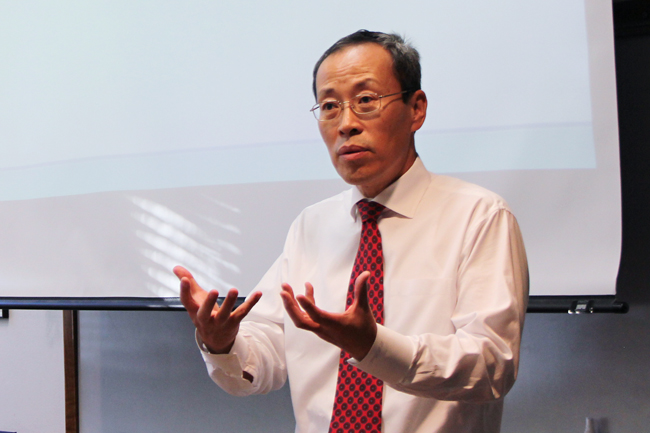In a speech on campus Wednesday, Suk-bum Park, consulate general of the Republic of Korea, said that, although there are many cultural differences between the U.S. and South Korea, increases in trade have improved the two countries’ diplomatic relationship with each other.
Park is responsible for spreading Korean cultural awareness in Southeastern U.S., including Texas, Mississippi and Oklahoma.
Park said that despite differing in cultural viewpoints, the two countries have still managed to get along.
“The U.S. is seen from the outside as a superpower,” Park said. “It’s a big juggernaut, a behemoth, something [Korea] cannot touch. … But the status quo in East Asia is changing. South Korea has … formed a relationship based on mutual trust with the U.S.”
Park said a major benchmark in U.S.-Korea relations was the Mutual Defense Treaty, signed in 1953, which led to a 60-year friendship between the two nations.
“The U.S.-[Republic of Korea] treaty gave birth to an unshakable alliance between the U.S. and Korea,” Park said. “These alliance relations … were the lynchpin to peace and stability in East Asia.”
Stratton Gaines, an Asian cultures and languages sophomore, said he attended the talk because of his enthusiasm for the region.
“I have a strong interest in East Asian relations,” Gaines said. “I plan on working, maybe, in the future in a diplomatic position, so it’s a field I’m interested in.”
Robert Oppenheim, director of the Center for East Asian Studies, said the relationship between the U.S. and Korea was particularly important because of the economic ties between the two countries.
“The alliance between the U.S. and [Korea] is one of the oldest relationships the U.S. has in Asia, and factors as well into a lot of other
important regional issues,” Oppenheim said. “South Korean technology, industry and investment of other sorts are themselves increasingly important, globally.”
Park also pointed out economic benefits Korea brings to the United States, mentioning the country’s role in manufacturing products, such as computers, cars and chemicals.
“South Korea has transformed into one of the major trade nations,” Park said. “Take, for example, some major brand names, like Hyundai [or] Samsung. These names, somehow, have become household names for many people.”
Park said the influence of pop stars, such as South Korean singer PSY, has boosted the Korean economy and U.S.-Korea relations as well.
“His name and his style have become famous throughout the world,” Park said. “He’s even more famous than the [Korean] president.”


















